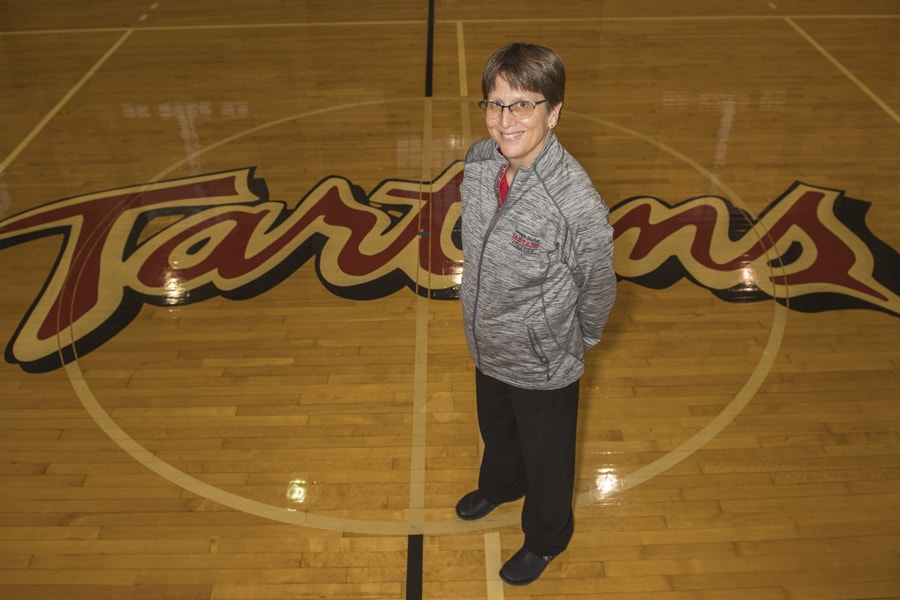
Personal Mention
Joan Maser, coordinator of athletic support services, is retiring this week after 38 years of service to Carnegie Mellon. As coordinator of athletics support services, Maser has been responsible for scheduling and coordinating travel arrangements for Carnegie Mellon’s 18 intercollegiate sports teams since 1986. Maser also handles purchasing and is involved in the planning and execution of special events for the Department of Athletics, Physical Education and Recreation. Since joining CMU, she has played many roles, from head field hockey coach, physical education instructor and assistant athletic trainer to associate director of athletics. “Joan has made an impact on the experience of thousands of student-athletes – as an athletic trainer, coach, administrator and educator. She has been a friend to all, and it is difficult to imagine our athletics department and university without her steady presence,” said Director of Athletics Joshua Centor. Learn more about Maser.
 Daniel Nagin, professor of public policy and statistics at the Heinz College, co-authored a study that found childhood behavior can predict economic success later in life. The study, published in the journal JAMA Psychiatry, found boys and girls who were inattentive at age 6 had lower earnings in their 30s after taking into consideration their IQ and family adversity. The study also found that boys who were physically aggressive or oppositional and who refused to share materials or blamed others had lower annual earnings in their 30s. And males who were prosocial, and shared or helped, had higher earnings. The study used data from the Quebec Longitudinal Study of Kindergarten Children, a population-based sample of predominantly white boys and girls born in 1980 or 1981 in Quebec, Canada, who were followed from Jan. 1, 1985, to Dec. 31, 2015. In sum, 2,850 children were assessed. The data included behavioral ratings by kindergarten teachers when the children were 5 or 6 years old, as well as 2013 to 2015 government tax returns when the participants were 33 to 35 years old. Find out more.
Daniel Nagin, professor of public policy and statistics at the Heinz College, co-authored a study that found childhood behavior can predict economic success later in life. The study, published in the journal JAMA Psychiatry, found boys and girls who were inattentive at age 6 had lower earnings in their 30s after taking into consideration their IQ and family adversity. The study also found that boys who were physically aggressive or oppositional and who refused to share materials or blamed others had lower annual earnings in their 30s. And males who were prosocial, and shared or helped, had higher earnings. The study used data from the Quebec Longitudinal Study of Kindergarten Children, a population-based sample of predominantly white boys and girls born in 1980 or 1981 in Quebec, Canada, who were followed from Jan. 1, 1985, to Dec. 31, 2015. In sum, 2,850 children were assessed. The data included behavioral ratings by kindergarten teachers when the children were 5 or 6 years old, as well as 2013 to 2015 government tax returns when the participants were 33 to 35 years old. Find out more.
 Assistant Professor of Chemical Engineering Zachary Ulissi will be one of the first to use the new Perlmutter supercomputer in early 2020. The Perlmutter, designed by Cray Inc., will be able to perform 100 million billion floating point operations per second (FLOPS). According to the National Energy Research Scientific Computing (NERSC) Center, Perlmutter is the first supercomputing system designed to enable both data analysis and simulation. Ulissi and his research team will be using Perlmutter’s expanded computing power to accelerate their search for new materials that can serve as active catalysts for renewable energy chemistries. His project was chosen as part of the NERSC Early Science and Application program, and will be used to demonstrate to future users the impact of the new machine, and to verify that it runs according to its targeted specifications. Find out more.
Assistant Professor of Chemical Engineering Zachary Ulissi will be one of the first to use the new Perlmutter supercomputer in early 2020. The Perlmutter, designed by Cray Inc., will be able to perform 100 million billion floating point operations per second (FLOPS). According to the National Energy Research Scientific Computing (NERSC) Center, Perlmutter is the first supercomputing system designed to enable both data analysis and simulation. Ulissi and his research team will be using Perlmutter’s expanded computing power to accelerate their search for new materials that can serve as active catalysts for renewable energy chemistries. His project was chosen as part of the NERSC Early Science and Application program, and will be used to demonstrate to future users the impact of the new machine, and to verify that it runs according to its targeted specifications. Find out more.
